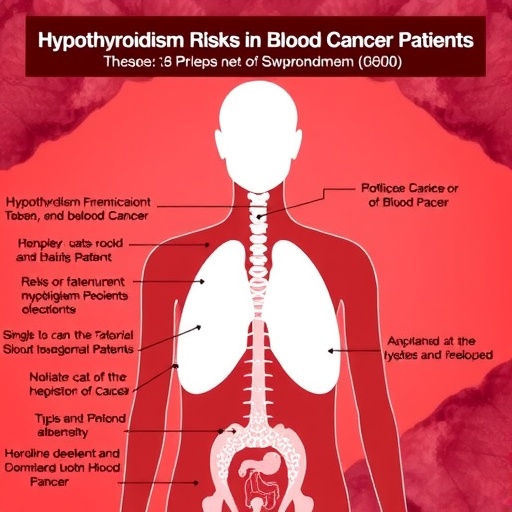In a groundbreaking comprehensive meta-analysis published in BMC Cancer, researchers have unveiled compelling evidence that patients diagnosed with hematological malignancies (HMs) face a markedly increased risk of developing hypothyroidism compared to the general healthy population. This systematic review and meta-analysis, which synthesized data from 32 studies, brings crucial light to the long-overlooked endocrine complications linked to hematologic cancers, signaling a dire need for enhanced screening protocols and proactive endocrine management in this vulnerable patient group.
Hematological malignancies, encompassing a wide array of blood cancers such as lymphoma and leukemia, have long been scrutinized for their direct oncological consequences. However, this new research shifts the focus by elucidating the significant secondary endocrine dysfunctions, notably hypothyroidism, that afflict these patients long-term. Hypothyroidism, characterized by inadequate thyroid hormone production, precipitates a host of symptoms ranging from fatigue and weight gain to serious cardiovascular consequences, underscoring the importance of early detection.
Through a meticulous systematic search of major databases including PubMed, Scopus, and Web of Science, the investigators accumulated data up to April 2025 to calculate pooled incidence rates of hypothyroidism among HM patients. Employing a robust random-effects statistical model allowed the team to handle variability across studies while generating reliable pooled risk estimates. Their findings revealed a startling fivefold increase in the risk of hypothyroidism in hematological cancer patients, with a pooled hazard ratio (HR) of 5.47 and a 95% confidence interval spanning 3.11 to 9.61, underscoring both the magnitude and statistical significance of the phenomenon.
A particularly alarming finding was the disproportionately high risk observed in patients battling lymphoma. These individuals exhibited an HR of 8.62 for developing hypothyroidism, signifying an eightfold greater likelihood compared to healthy counterparts. This heightened susceptibility may be attributable to the intensive therapeutic regimens lymphoma patients undergo, as well as the direct vulnerability of thyroid tissue to both malignant processes and treatment-related insults.
Delving deeper into risk stratification, the meta-analysis identified several critical demographic and treatment-related factors that significantly influence hypothyroidism incidence. Female patients were notably at greater risk, aligning with the broader epidemiological pattern of thyroid disorders which preferentially affect women. The effects of anticancer treatments also emerged as significant contributors: chemotherapy, radiotherapy (RT), and total body irradiation (TBI) were all robustly linked with increased hypothyroidism risk. These modalities, while essential for malignancy control, have well-documented thyroidotoxic potentials that exacerbate endocrine dysfunction.
In contrast, the analysis revealed no significant correlations between hypothyroidism and other clinical variables such as the presence of chronic graft-versus-host disease (cGVHD), administration of alkylating agents, cyclophosphamide use, donor source, histological subtype (nodular sclerosing), disease stage, or stem cell source. These insights delineate which factors warrant closer consideration when assessing patient risk profiles and which may be less influential than previously suspected.
The rigorous assessment of heterogeneity among the included studies, quantified via the I² statistic, alongside evaluation of publication bias with funnel plots and Egger’s test, strengthens the credibility of the meta-analytic conclusions. By implementing these methodological safeguards, the research team ensured robustness, minimizing potential biases that could otherwise distort incidence estimates or risk factor associations.
The implications of this research are profound for clinical practice. Oncologists and endocrinologists must recognize hematological malignancy patients, especially women and lymphoma sufferers, as a high-risk cohort necessitating early and routine thyroid function monitoring. Given the insidious onset of hypothyroidism and its deleterious impact on quality of life and treatment outcomes, integrating endocrine surveillance into standard HM patient care pathways becomes imperative.
Furthermore, this study invites future research to explore mechanistic pathways linking hematologic cancers and treatment modalities to thyroid dysfunction. Understanding the molecular and cellular underpinnings could pave the way for innovative protective strategies or adjunctive therapies that mitigate the endocrine sequelae without compromising oncologic efficacy.
As cancer survivorship continues to improve, with more patients achieving remission or long-term management, attention to late complications such as hypothyroidism assumes greater importance. This comprehensive meta-analysis serves as a clarion call to reframe survivorship care models to encompass not only tumor control but also holistic endocrine health preservation.
In summary, the meta-analytic findings decisively confirm that hematological malignancies significantly predispose patients to hypothyroidism, with lymphoma patients facing the greatest risk. Female sex and various cancer treatment modalities, particularly radiotherapy and total body irradiation, were identified as key risk determinants. These revelations underscore an urgent need for tailored screening strategies and multidisciplinary management frameworks to safeguard thyroid function and optimize overall patient well-being.
The evidence presented advances the field’s understanding of cancer-related endocrine complications and spotlights hypothyroidism as a critical survivorship issue among hematological cancer patients. Medical professionals, researchers, and policymakers must heed this data to enhance clinical guidelines, standardize thyroid monitoring, and develop targeted interventions that address the nuanced needs of this expanding patient population.
By synthesizing global research and translating it into actionable insights, this study exemplifies the power of meta-analyses to refine medical knowledge, challenge prevailing paradigms, and ultimately improve patient outcomes in complex disease contexts. It is a pivotal contribution that bridges oncology and endocrinology, fostering integrated care pathways for hematological malignancy survivors worldwide.
Subject of Research: hypothyroidism incidence and risk factors in patients with hematological malignancies compared to healthy population
Article Title: Incidence and risk factors of hypothyroidism in patients with hematological malignancies compared to healthy population: a systematic review and meta-analysis
Article References:
Moradi, Z., Toutounchian, S., Eghbali, Z. et al. Incidence and risk factors of hypothyroidism in patients with hematological malignancies compared to healthy population: a systematic review and meta-analysis. BMC Cancer 25, 1788 (2025). https://doi.org/10.1186/s12885-025-15228-z
Image Credits: Scienmag.com
DOI: 10.1186/s12885-025-15228-z (Published 19 November 2025)
Tags: cardiovascular consequences of hypothyroidismearly detection of hypothyroidism in cancerendocrine complications of blood cancershypothyroidism in blood cancer patientsimplications of thyroid health in hematologicalmanagement of endocrine dysfunction in blood cancermeta-analysis of hematological malignanciesprevalence of hypothyroidism in lymphoma and leukemiarisks of hypothyroidism in hematological malignanciesscreening protocols for hypothyroidism in cancer patientssystematic review of hypothyroidism risksthyroid hormone production issues in cancer patients





